
by World Moms Blog | Oct 22, 2014 | 2014, Africa, Awareness, Being Thankful, Caring, Casting a Wider Net, Communication, Economy, Education, Girls, Government, Guest Post, Helping, Human Rights, Humanitarian, Humanity, Inspirational, International, Life, Loss of Child, Media, Motherhood, Nigeria, Older Children, Poverty, Prejudice, Relationships, Safety, School, Social Equality, Terrorism, Tragedy, Women's Rights, Working Mother, World Mom Feature, World Motherhood, World Voice
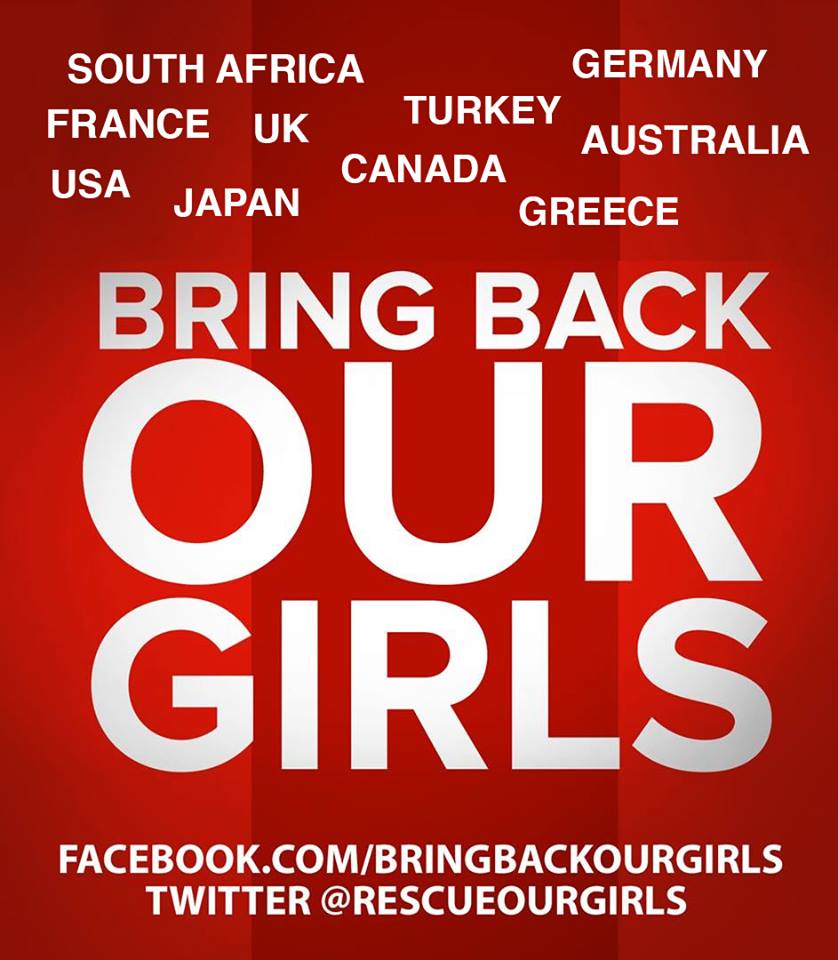 “My daughter said she was going to go to school so that she can wipe away my tears. How is she wiping my tears away in the den of the terrorists?”
“My daughter said she was going to go to school so that she can wipe away my tears. How is she wiping my tears away in the den of the terrorists?”
-mother of one of the #ChibokGirls, abducted on April 14th, 2014, speaking on Day 188 of their abduction -October 19th, 2014
As I looked at her I realized that all this woman’s hopes and aspirations rest on her daughter. For most of the poor people in this part of the world, children are like a source of pension; they are the ones that will help you in the future. They are the ones that will take care of you in your old age, when you are unable to look after yourself. They represent life. As I looked at her I also realized that her daughter means more to her than I can ever imagine. Her daughter is her everything. A source of hope.
These parents are ready to give their lives for their children to have an education. That was what the #ChibokParents did. Amidst the insecurity in Nigeria, they still wanted their children to be educated to better their positions in life. They knew the only way to break the shackles of poverty was through education. For daring to send their children to school to have a better life, instead they have been punished.
These children grow up to not only take care of their parents but siblings as well so that a generation of people who have survived the shackles of poverty would emerge.
For some, poverty is going to school in the morning without breakfast and returning home not expecting lunch but still striving everyday to be in school so that one day you will look back and say I SURVIVED (I AM A SURVIVOR).
I remember one of the fathers at one of our Sit Ins for the #BringbackOurGirls campaign—which started on April 30th with a protest demanding for the rescue of #ChibokGirls—saying he does not have a Television. All he has is a Radio from which he gets to hear of our activities. I wept! In this day of iPads, Tablets, iPhones and what have you, someone does not have a simple television that most of us take for granted.
So now you can begin to understand that to the #ChibokParents these girls are much more than daughters, they are future benefactors
A lot of parents, especially mothers, are forced to live a life of servitude and poverty in order for their children to be educated. The education that is taken for granted in most developed countries is not so in Nigeria and many other African countries.
I remember growing up and how my parents had to struggle to make sure we were educated. We often had to go without food when the situation grew dire but never were my school fees unpaid. I remember my father trekking long distance to buy a textbook I needed badly because the money was not enough for him to pay for a bus. All the suffering was for the children to be able to break the vicious cycle of poverty and one day to be able to take care of ourselves and also take care of our parents and siblings.
A lot of parents invest all they have in their children. For those who are poor, they do not have cars, houses or any investments. All they have are their children. Can you imagine these children being abducted, as is the case with the #ChibokGirls, abducted from school, where they wanted to get an education and make life better for themselves and their families? When these children of the poor are abducted and taken away, the future of a whole generation also is taken away.
As I looked at the woman with tears streaming down her face, all I could see was my own mum, who had to be the head-of-household, who worked all day and night to ensure I had an education. I look back to the days when there was no food to be eaten and yet we found our way to school. I thought of what a burden it must have been for my parents to get us educated, to sacrifice all that they had.
While some of my parent’s contemporaries were busy enjoying life in the way they could with what they had, my parents tightened their belt to make sure that we, their children, had an education and of course today we are their pension. If any of us had been abducted while seeking an education, where would we be today?
As I stood watching the Chibok mother, all I could think about was my mother struggling to give her children the life she did not have and how hard she worked to provide that for us. I thought of my mother, now living in the lap of luxury because she worked so hard four sake. As I stood looking at the Chibok Mother, I realized she too must be allowed to break the shackles of poverty. She too must live in comfort, as her daughter promised her. Her tears must be wiped away. As I stood looking at her I realized that I cannot stop demanding for the rescue of the #ChibokGirls, for that Chibok mother who has given her all, hoping that one day her tears would be wiped away.
I realized that I must demand the rescue of the Chibok girls.We all must.
Demanding the safe return of the Chibok girls to me is like making a demand for the ME that was 23 years ago. As I stood I realized that no matter how hard it gets, no matter how much we are intimidated and harassed, no matter the threat of arrest from our government, I cannot afford to give up on the #ChibokGirls.
To give up on the #ChibokGirls is to give up on myself (the WHO that I have become) and to give up on the mother with tears streaming down her face, waiting for her daughter, who promised to wipe away her tears.
This is an original, Guest Post for World Moms Blog from our sister in Nigeria and mother of two, Aisha Yesufu.
Aisha Yesufu was born in Kano, Nigeria. When she turned 40, in December 2013, she decided it was time to devote her life fully to the services of others. As she describes it,
‘The first 40 years of my life I devoted to myself, so I could be financially independent and help others. But they say: you can’t help the poor by being poor yourself, so the next 40 years, God willing, I am going to devote to others; for me, a full life will be based on what positive differences I have made in the life of another.”
And in came the unfortunate tragedy of the abduction of the #ChibokGirls. Following their abduction, on April 14th 2014, Aisha joined a group of like minded people to demand the rescue of the 219 school girls, who still today remain in the hands of the terrorists. These girls, between the ages of 16 to 18, were abducted from their school, in their quest for knowledge. The group known as the #Bring Back Our Girls campaign has been able to push the issue of their rescue in public discussion both locally and internationally.
Aisha is the coordinator of the daily Sit In for the #BringBackOurGirls campaign group. The group has, without fail, come out daily since the 30th of April, 2014, despite all forms of intimidations and harassment by sponsored persons.
To get involved in the conversation and learn more about the plight of the 219 Nigerian School Girls, visit: #BringBackOurGilrs
World Moms Blog is an award winning website which writes from over 30 countries on the topics of motherhood, culture, human rights and social good. Over 70 international contributors share their stories from around the globe, bonded by the common thread of motherhood and wanting a better world for their children.
World Moms Blog was listed by Forbes Woman as one of the "Best 100 Websites for Women 2012 & 2013" and also called a "must read" by the NY Times Motherlode in 2013. Our Senior Editor in India, Purnima Ramakrishnan, was awarded the BlogHer International Activist Award in 2013.
More Posts

by Purnima Ramakrishnan | Oct 11, 2014 | 2014, Feminism, Girl Child, Human Rights, Humanity, India, Inspirational, Maternal Health, Purnima, School, Sex, Sexuality, Social Equality, Social Good, The Advocates of Human Rights, The Alchemist, United Nations, Women's Rights, World Events, World Interviews, World Mom Feature, World Moms Blog, World Motherhood, World Tour, World Voice
In celebration of International Day of the Girl, our Senior Editor in India, Purnima Ramakrishnan, interviewed the heads of a very special school in India. What she learned and felt was nothing short of amazing…
I was ushered in, inside the Vice-Principal’s room when I expressed my desire to interview both, the VP and the Head-Mistress. It was a completely relaxed chat, and I was so surprised about the open-door policy embraced by this school for all its teachers and students. All my prepared interview questions flew out of my head as they talked about the school, the students and their passion for teaching.
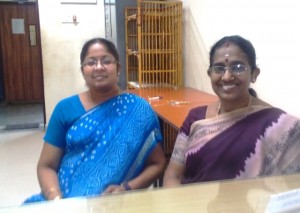
Mrs. Bhavani Baskar, The Vice-Principal (left) and Mrs. Jayashree Subramanian, Head-Mistress (right) of the PSBB Millennium School
During the chat, I observed so many students and teachers, and other staff members of the school, knocking and walking in with something or the other which needed either the Vice Principal’s or Head mistress’ intervention. No, you don’t need any appointment to go and say ‘Hello’ to them. None of the students did.
And as we proceeded to chat, I became more surprised and awed at the way they addressed students on a first name basis, from various grades who had popped in for a chat. Who could remember so many names? They did!
It has been a great pleasure to chat with Mrs. Bhavani Baskar, The Vice Principal and Mrs. Jayashree Subramanian, the head Mistress of PSBB Millennium School in Chennai, India. They spoke about their teaching journey, their vision for girls and boys in the school and the murals. It was the murals which sparked my curiosity and led me into their doorway. I included picture of them throughout the interview below, and I hope you find them as beautiful, as I did! Now on to the interview…
What inspired the murals? Who did them?
Initially, we got a palm imprint from all the girls of the school to say, “I am proud of being a girl.” The boys of the school wanted to join, too, to say, “We respect you.” This was done to celebrate the “Day of the Girl Child.”
These murals were an extension of the same theme.
The senior students were encouraged to paint the walls sharing their thoughts on being a girl, and the boys also joined, to express how they felt about their girl-classmates. The result was the lovely messages that came across on the walls.

Mother Earth Needs Her Daughters
What was the effect of the murals?
They are receiving a lot of attention. The occurrences of boys teasing girls has reduced considerably. Bullying is also greatly reduced. Respect between the genders has increased. The general attitude has improved.
These murals are painted at the backdrop of the playground, and all the children at some point in time look at them at least once a day. And whether they want to or not, they have to acknowledge their presence consciously or subconsciously. Children right from grade 1 to 12 share the playground and so they would look at them. They would talk about them. And it would create an impact as to how girls are viewed.
The murals affect the thought process of both the boys and girls as they grow up. Boys would respect girls and girls would grow up to be secure, and confident in this society.
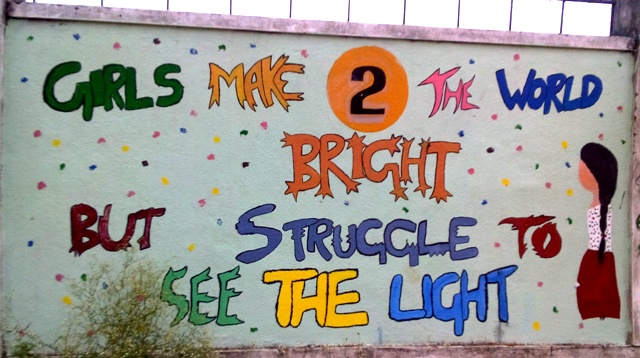
Girls Make The World Bright, But Struggle To See The Light
What is the % of boys and girls in the school?
Boys beat girls by being 54% and girls are 46%. But this is still a great ratio for the state where female infanticide is rampant in the rural areas.

Let Me See The World
Can you comment about the performance of the girls and boys in the school?
Girls always out-beat boys! They are more sincere, they are meticulous in their planning and definitely more hardworking.

Do Not Let My Life End
They also spoke about their respective personal teaching career and their journey in the school. Mrs. Bhavani Baskar, the Vice Principal joined as a Mathematics teacher and now in addition to her duties as a Vice Principal, she continues teaching Mathematics for Grade 12. She is also the HOD for the Math department. She has more than 20 years of teaching experience in mathematics, and she is passionate about it.
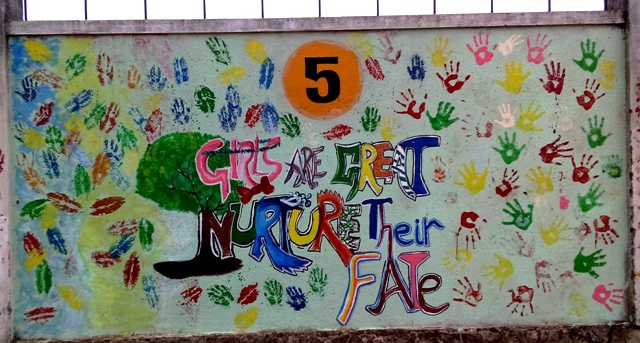
Girls Are Great, Nurture Their Fate
Mrs. Jayashree Subramanian, the Head Mistress is also the HOD of the Social Science department. She also manages dual responsibilities and says she would never trade the joy she finds in teaching for anything. When I asked about her retirement, she says, she is a grandmother, too, and would love to go and spend time with her grandchild. But she feels strongly attached to the school, the children, and even to the principal.

A Girl Child Today, A Mother One Day
The Principal of the PSBB Millennium School, Mrs. Sita Uma Maheswaran also had a few words for World Moms Blog in spite of her very busy schedule. The below conversation is from the Principal.
Do you feel like there is a true cultural shift taking place to recognize the importance of the girl child?
On one hand, we Indians, have so many woman deities being worshipped as God. On the other hand, we still have women and young girls being gang raped.
There is a lot of talk happening about justice and equality but it us yet to reach the rural level. Urban girls are more enthused, and they do pride in their being a woman and appreciating girls. But it is a known fact that there are certain cities where women fear to step out.

Girls Are Great, learn To Appreciate Them
What is the main factor driving this force?
Attitude among men is the main factor, irrespective of whether they are educated or not. The way they have been brought up with values in life, the way they have seen their mother or sister being treated – this can have a great effect!
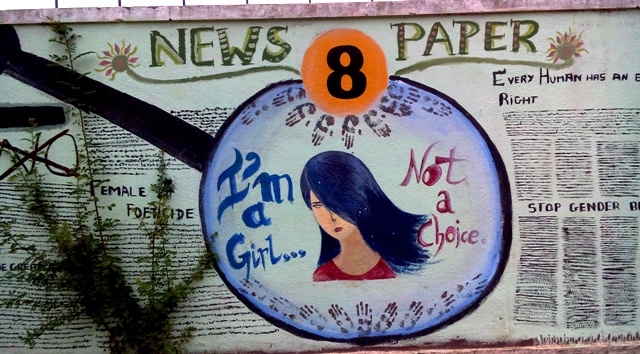
I Am A Girl, Not A Choice
How do you think these murals are affecting the thought process of girls and boys in the school?
There is respect which is breeding unknowingly for the girls, from the side of the boys. They realize that girls are to be respected and appreciated.

Give Girls The Wings To Fly
What was your journey like to become the principal of such a prestigious school?
I began as a Teacher Trainee in PSBB Senior Secondary School in 1986. It has been a roller coaster ride since then. There have been many a thrilling moments and a lot of learning. It is but natural when you get to work under some one like Dr Mrs Y G Parthasarathy, The Dean and Director of the school. Becoming Principal was a lot of responsibility. The work is more challenging. My perspectives have changed, too, because of the broader outlook. I work with more people now, and the goals that I set for myself are different, too.

Girl Child – The Greatest Gift To Mankind
What is your one wish for girls in your school and all over the world?
Mrs. Jayashree Subramanian, the Head-Mistress said, ” I want girls in my school and all over the world to have self-respect, self-esteem and know that they are powerful. I want to teach the girls in my school to face the challenging world with confidence and courage and know that they can be whatever they aspire you to.”

K(no)w Mother, K(no)w Daughter, K(no)w Life
Mrs. Bhavani Baskar, The Vice Principal said, “I want to teach my girls courage, valor and self-esteem. The great South Indian poet Bharathi said, “It is a great blessing to be born as a human, and even greater honor and privilege to be born as a woman.” I want my girls to realize that. I want my girls to be mothers, sisters, daughters and to be an embodiment of love for this entire race.”
There were a few other teachers too who shared their wish for girls everywhere.

Girls Education Can Change The World

Mrs. Mukhtar Tahsin Fathima, 3 – grade teacher
Mrs. Mukhtar Tahsin Fathima, the third grade teacher said, “I want all girls to have awareness about sexual education. I want them to know and be able to protect themselves under any untoward circumstances. I want little children, both, boys and girls, to be given adequate sexual education, and the ability to take care of themselves and seek help when they need it. They should also let down their reservations, shyness and taboo and come out and speak and discuss and be aware of things.”

Mrs. Deepa Seshadri, English Teacher
Mrs. Deepa Seshadri, the English teacher said, “I want my girls to be able to wear and talk what they feel like. They should have the freedom to be natural and happy. They should not have to live in a world where any spontaneous or innocent act is misconstrued in a wrong way. My girls as well as boy students should be able to live in a world which is liberated from prejudice of gender-related actions.”

Mrs. Banu, Kindergarten Teacher
Mrs. Banu the Kindergarten teacher said, “I want equality for all my students. When gender equality is ensured, everything else follows. Education of girl-child, empowerment of women, better living conditions for girls and women and many such issues are resolved.
Girls have a say in everything happening with them. They are independent, and they get to decide what they want to do with their lives. I have brought up my daughter, instilling that she is equal or better than just about any of her counterparts. Every mother and teacher need to do the same with their children. “
The Principal of the school, Mrs. Sita Umamaheswaran said, “I want my girls to know they are no less than any boy or man. To dream big, and set goals that they can work toward. Enjoy womanhood and be in a world that respects women and safeguards them.”
The students of this school have expressed their wish for girls across the world, through these hand-painted, beautiful and striking murals.
What is your wish for the Girl-Child across the world?
This is an original post from our World Mom and Senior Editor in India, Purnima Ramakrishnan on the occasion of the “#DayOfTheGirl Child.”
Her contributions to the World Moms Blog can be found here. She also rambles at The Alchemist’s Blog.
Photo credit for the murals, to the PSBB Millennium School.
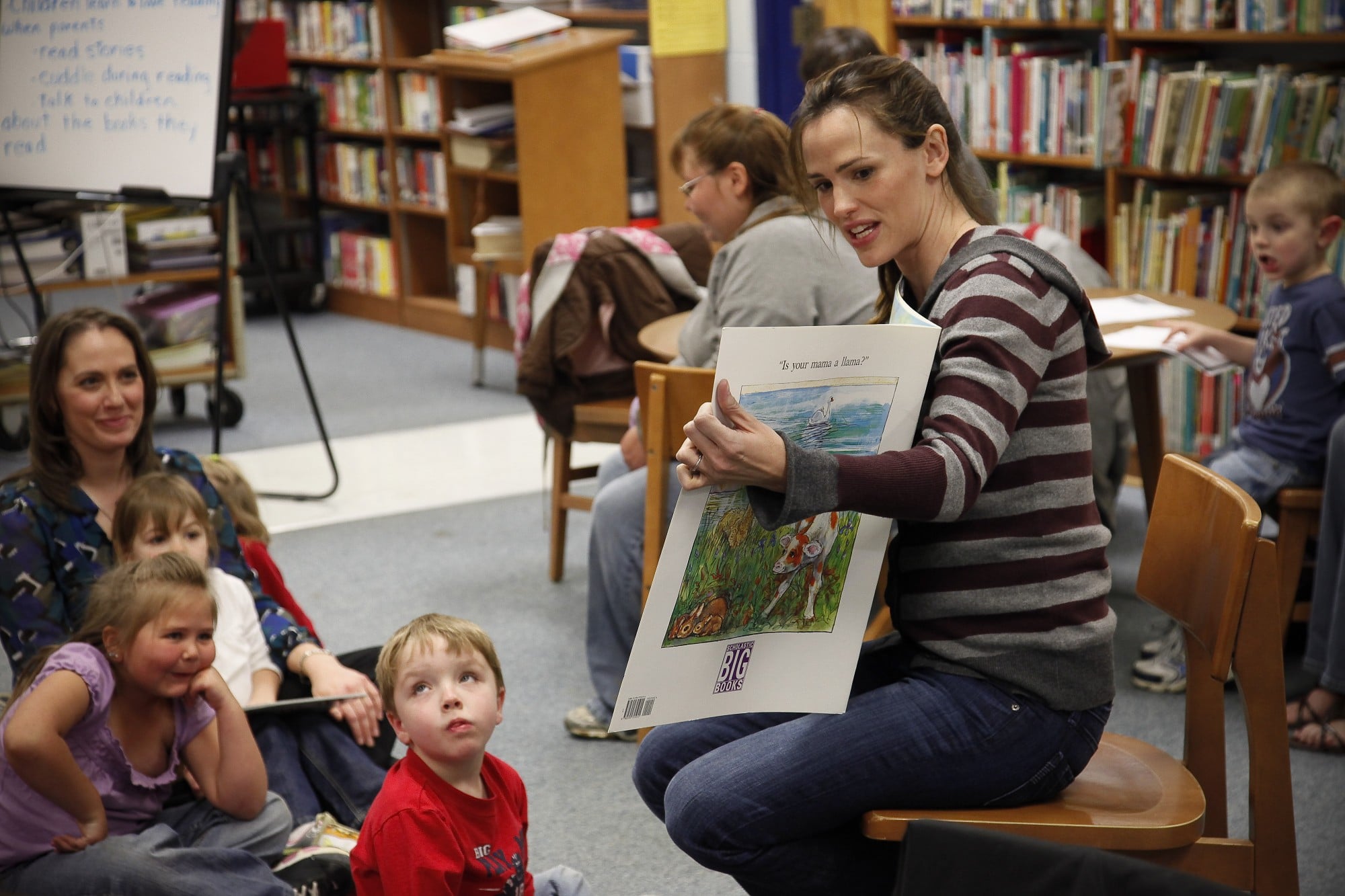
by Elizabeth Atalay | Sep 30, 2014 | 2014, Awareness, Childhood, Education, Humanitarian, Interviews, Preschool, Save The Children, School, Social Good, USA, World Interviews
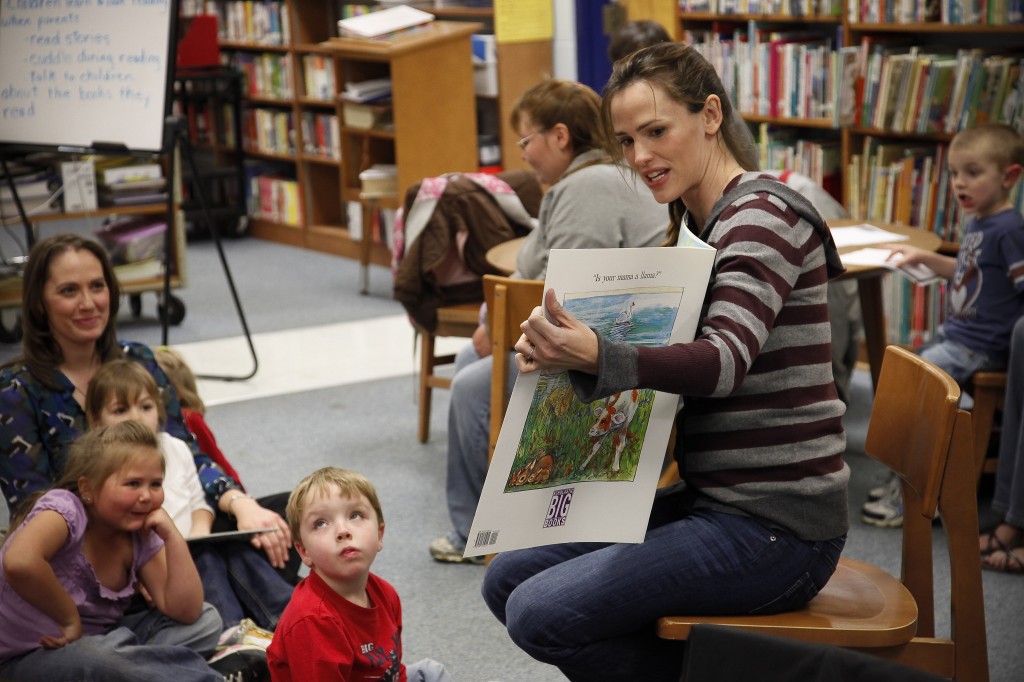
Actor Jennifer Garner visits with school children who are participants of a Save the Children reading program at LBJ Elementary School in, Ky. Photo by David Stephenson
“OPTIMISM”, Jennifer Garner chose the word optimism when we interviewed her about her work with Save The Children and the #FindTheWords campaign. My word had been “LEAD”, Jen Burden’s was “CREATE”, and Stacey Hoffer Weckstein of Evolving Stacey, who did the interview with me, had “COURAGE”. These were our words in the 30 words, 30 days blogger challenge for #FindTheWords to represent the 30 million fewer words kids would learn in homes without early education. In turn, when we had the exciting opportunity to interview her, we asked Jennifer Garner what her word would be.
“If you are working with a baby, with a mom, with a toddler, there is just so much optimism, she explained. I just feel like it’s just the most optimistic thing in the world to work on early childhood stuff”.
The investment in early education is optimism at it’s best. Studies have shown that the impact of early education can have long reaching effects as a child grows up. Kids are better academically prepared, socially adjusted, and tend to stay in school longer when they receive early education. In our conversation Jennifer Garner pointed out that some states have figured out that the money they spend from birth to five years old goes so much further than the recidivism that they would otherwise spend when a child is older and having trouble.
The hard facts cited by Save The Children are that in the United States 1 in 4 children lives in poverty and many do not have a single book in their home. These kids are not read to, and will not have access to a pre-school education. By age three they will have heard an average of 30 million less words than their peers which puts them at a great disadvantage before they even reach school. Ultimately these kids are 70% more likely to be arrested for violent crimes, 40% more likely to become a teen parent and 25% more likely to drop out of school.
“The injustice of it hits me at my very core.” said the mother of three.”So I just feel this drive to help be a part of making it be better.”
Jennifer Garner feels lucky to have come from a home with educated parents, but growing up in rural America, in West Virginia, she was aware that it was education that had made an enormous difference in both of her parents’ lives. In each case they were the first in their families to go to college, and it made her wonder who was around to help other kids like them to succeed without role models? Once she knew that this was the area in which she wanted to use her voice to make a difference, it was Mark Shriver, and Save The Children that she found was making the type of impact she was looking for in rural America.
Taking time out of her busy day with one of her little ones not feeling well, less than two weeks before her latest film, Alexander and the Terrible, Horrible, No Good, Very Bad Day hits theaters, to tell us why the issue of early education resonates with her was gracious beyond belief. She explained that her experience in the field with Save The Children, visiting mothers and children, had only made her want to do more. “The more you are let into people’s homes, and into people’s lives, and into people’s struggles, the more driven you become to do what you can to help them.”
Of the mothers she has had the chance to visit Jennifer says often “These moms are isolated, they’re tired, they don’t have mom friends or computers to read what you guys are writing about or to be encouraged.” ….” so when Save The Children rolls up and goes once a week to see them, they bring them books , they bring light, they bring life. And the main thing that I love to see is they bring encouragement for these moms.”
I asked Jennifer Garner her wish for all moms, to which she replied….
“Motherhood is the great equalizer, right? We’re all, as soon as you have a baby, we all have the same love and hopes, and dreams, and fears, and vulnerabilities, and I would just hope that nobody feels like they are going through it alone……it’s really hard to do on your own”
That’s exactly how we feel in our global community of World Moms, we are here to remind each other that we are not alone, in this crazy adventure of motherhood.
This is an original post written for World Moms Blog by Elizabeth Atalay. Elizabeth had the opportunity to interview Jennifer Garner as part of the #FindTheWords campaign with Save The Children. She also writes at documama.org.

Elizabeth Atalay is a Digital Media Producer, Managing Editor at World Moms Network, and a Social Media Manager. She was a 2015 United Nations Foundation Social Good Fellow, and traveled to Ethiopia as an International Reporting Project New Media Fellow to report on newborn health in 2014. On her personal blog, Documama.org, she uses digital media as a new medium for her background as a documentarian. After having worked on Feature Films and Television series for FOX, NBC, MGM, Columbia Pictures, Warner Brothers, 20th Century Fox, and Castle Rock Pictures, she studied documentary filmmaking and anthropology earning a Masters degree in Media Studies from The New School in New York. Since becoming a Digital Media Producer she has worked on social media campaigns for non-profits such as Save The Children, WaterAid, ONE.org, UNICEF, United Nations Foundation, Edesia, World Pulse, American Heart Association, and The Gates Foundation. Her writing has also been featured on ONE.org, Johnson & Johnson’s BabyCenter.com, EnoughProject.org, GaviAlliance.org, and Worldmomsnetwork.com. Elizabeth has traveled to 70 countries around the world, most recently to Haiti with Artisan Business Network to visit artisans in partnership with Macy’s Heart of Haiti line, which provides sustainable income to Haitian artisans. Elizabeth lives in New England with her husband and four children.
More Posts

by Ann Marie Wraight | Sep 22, 2014 | 2014, Education, Government, Greece, School, World Motherhood
 Who hasn’t heard of the name Pythagoras before? Or, for that matter Archimedes, Aristotle, Plato or Hypatia? Even if you don’t know exactly what these people believed or taught, those ancient names probably ‘ring a bell.’ For those of you fortunate enough to have had a good level of education you will probably be familiar with the Pythagorean Theorem. Remember those maths lessons back then when we were teens? Most of you will recognise the above names as originating from Ancient Greece. Pythagoras, for instance, is best known as a mathematician who lived in the 500’s BC and also pursued knowledge in the fields of music and philosophy.
Who hasn’t heard of the name Pythagoras before? Or, for that matter Archimedes, Aristotle, Plato or Hypatia? Even if you don’t know exactly what these people believed or taught, those ancient names probably ‘ring a bell.’ For those of you fortunate enough to have had a good level of education you will probably be familiar with the Pythagorean Theorem. Remember those maths lessons back then when we were teens? Most of you will recognise the above names as originating from Ancient Greece. Pythagoras, for instance, is best known as a mathematician who lived in the 500’s BC and also pursued knowledge in the fields of music and philosophy.
Well, I’m really proud to live in a country which has such a history of academic and cultural excellence. In addition to the world of academia, remember that the first Olympic Games took place in Olympia in 776 BC! Can you imagine that? Most people think of the Games as being a much more recent creation. However, the concept of combining physical excellence and political and social benefits had its inception in Greece many centuries prior to the modern day games that we are currently familiar with.
So, with such an impressive and honourable history in sport, teaching and education, how does Greece’s glorious past influence its present generation of scholars?
Tragically, the politicians and educators who are responsible for the education system in modern Greece seem to have forgotten ancient past glories.
Pupils who want to continue to tertiary education really have to suffer years of hell in order to get the grades they need for university or colleges. The state education system has been a disappointment to teachers, parents and pupils for decades, REGARDLESS of which political party has been in power. Teachers are ridiculously underpaid considering the years of hard work and expense they’ve invested in getting their degree. Parents are forced to pay for private tuition and students miss out on many areas of their childhood due to running nonstop from day school to evening tuition.
There was a lot of publicity this summer when a bright 16 year old girl wrote a letter to parliament complaining that she was a human being and not a robot! She also expressed her fury that the new system implemented this year was EVEN WORSE than the previous one. Now students grades are counted in the last THREE years before finishing secondary school. That means if you mess up in one or two lessons when you’re 15/16, those grades will haunt you through school till you’re 17/18 and lower your whole grade average. You don’t have the option to rewrite the lesson either! Too much pressure for too many children. This both saddens and amazes me! Those who are responsible for the national curriculum are highly educated and experienced in their fields. So why has there been such a public outcry this year at the new “improved” system?
Well, quite frankly, it’s dreadful!
Virtually all Greek children who want to get good grades follow a similar programme. They go to their state run schools till around 2o’clock. As state secondary schools don’t have dining halls or refectories, the children then go home to eat lunch or take their own packed lunch to school. In the afternoon the lessons continue as most tuition in the day school isn’t adequate to prepare students for national exams. This means parents are obliged to hire private tutors, if the family budget can afford them, or children have to go back to “Frontisteria” or private tutoring schools. The second option is usually a little cheaper than the first. I know many families who have 2 children and the monthly tuition fees are at least ONE of the parents salaries. Imagine other families I know who have 3 or 4 children!!! It’s pretty common for parents to get bank loans or sell property for their offsprings education BEFORE they go to uni/college. The Greek State has prided itself for decades on its free education system. In practical and realistic terms, I don’t know any child who has entered university without doing private lessons, going to a private day school or following courses at the evening “Frontisteria.”
So the idea of a free Greek education system is a farce in reality. The tragic thing is that with a crushed economy, in some demographics we have an unemployment rate of 40-50%. Many families now have only one breadwinner and its not uncommon to have families with both parents out of work.
So how can these families afford education? Basically, they can’t. They have to rely on the goodwill of state school teachers to give extra homework or work through breaks to cover the material which comes up in state exams.
Their kids also have to make super human efforts on their own if they want any kind of realistic job prospects.
I’m a private tutor myself and some years ago I worked in the UK doing language summer schools. I had teens from all over the world but I remember that some of my shiniest stars were from Greece and Japan. The Greek kids were very knowledgeable in many areas and I assumed the Greek education curriculum must rock! That was just before I came to live here when I realised that those students usually came from middle class homes and could afford all the extra tuition not included in the state system.
So what’s happening internationally about our right to free education and knowledge until at least the age of 17/18? I’m British so I take it for granted that compulsory education should be till 16 and all levels of education should be free until the end of secondary school. Acquaintances from around the world have told me similar stories about education in their countries. The general consensus is that state curriculums are getting worse and trying to guarantee your child’s entry to tertiary education means forking out an awful lot of money! Friends in the USA, UK and Germany have put their children into private day schools or boarding schools. Colleagues who live in Denmark praise their system but this is only one that I know of personally which gets a glowing report!
I hope that your system isn’t like our Greek system.
As my ambitious 14 year old son says:”Going to school here is like being sent to PURGATORY!”
I’d be really interested to know about the education system in your part of the world. Do you have to pay fees or is everything provided by the government?
This is an original post for World Moms Blog by Ann Marie Wraight of Greece. Photo credit: Tom Brown. This picture has a creative commons attribution license.

Having lived in 4 different countries, Ann Marie finds it difficult to give a short answer about where she's from. She regards herself: Brit by birth, Aussie by nature, with a sprinkling of Greek and German based on her insatiable appetite for tasty food and chilled beer!
This World Mom has been married to her Greek soulmate for 16 years and they are the proud but constantly challenged parents of two overactive teenage boys. (She secretly wonders sometimes if she was given the wrong babies when she left the maternity clinic.) She can't explain the fascination and ability that her 13 and 14 year-olds show in math and physics or that both boys are ranked 1st and 2nd nationally in judo. Ann Marie can only conclude that those years of breastfeeding, eating home cooked meals and home tutoring really DO make a difference in academic and physical performance! The family is keeping its fingers crossed that---with the awful economic crash in Greece---continued excellence in math and/or judo will lead to university scholarships...
In addition to writing, enjoying a good glass of wine and movies, Ann Marie also works as a teacher and tends their small, free-range farm in the Greek countryside.
More Posts

by Nadege Nicoll | Sep 5, 2014 | 2014, Family, Home, Kids, Me-Time, Milestones, Motherhood, Nadege Nicoll, Parenting, School, Time, USA, World Motherhood, Younger Children
 Back to school is not just about kids getting a new backpack, and a box of crayons. On back to school day, everybody in the family is going “back” to something. A norm, a rhythm, a routine. (more…)
Back to school is not just about kids getting a new backpack, and a box of crayons. On back to school day, everybody in the family is going “back” to something. A norm, a rhythm, a routine. (more…)
Nadege Nicoll was born in France but now lives permanently in New Jersey with her family. She stopped working in the corporate world to raise her three children and multiple pets, thus secretly gathering material for her books. She writes humorous fictions for kids aged 8 to 12. She published her first chapter book, “Living with Grown-Ups: Raising Parents” in March 2013. Her second volume in the series just came out in October 2013. “Living with Grown-Ups: Duties and Responsibilities” Both books take an amusing look at parents’ inconsistent behaviors, seen from the perspective of kids. Nadege hopes that with her work, children will embrace reading and adults will re-discover the children side of parenthood. Nadege has a few more volumes ready to print, so watch this space…
More Posts - Website
Follow Me:



by Melanie Oda (Japan) | Jul 31, 2014 | 2014, Cultural Differences, Food, Japan, School, World Moms Blog

chow_time
I read on the internet a lot about how America is trying to change their school lunch program and make it healthier. And I read a lot about how some people are not happy about this. They complain that kids won’t eat what they don’t like, food gets wasted, etc.
All of that may be true. But I thought I would share what school lunch is like here in Japan.
Children in elementary schools across the country receive a hot lunch every day. The menu is widely varied, with international kid favorites like spaghetti with tomato sauce, the local preference of curry and rice with salad and yogurt, to more traditional foods like fish with miso sauce, vegetable pickles, and wakame seaweed soup. Most days the meals are heavy on vegetables. They include fruit in season occasionally, and maybe once a month or so there is a light desert like jelly (jell-o) or ice cream. Some days they have rice, other days they have bread, still other they have noodles.
And, with a few exceptions, the kids love it!
Why is that?
Part of the reason may be attitude. When my husband was a kid, they didn’t have the facilities to prepare rice and noodles, so he looks at the monthly menu and says “ii na-,” I wish I could have had that! Let’s go back another generation, to my father-in-law. He had bread and milk only every day (ironically enough, he says it was supplied by the occupying US forces,) and he was grateful for it at a time when there may or may not have been dinner waiting for him at home. But- hamburger steak and pickled cabbage with tomatoes? “Ii na!”
In our city, preschoolers, junior high kids, and high school kids have to take their lunch. A bento lunch can be a wonderful thing, but it isn’t hot and doesn’t come with milk.
But perhaps the most important reason is that the kids themselves are involved in food preparation. Each week, half the class is in charge of serving the other half. They carry the pots and trays and multiple little dishes and utensils up to their classrooms, then ladle and scoop and pass the food to each other. When time is up, they clean it up and go have recess.
So if you don’t eat, or you take too long, you make your friends late for recess. That’s quite a motivator there, isn’t it?
Japanese children, in most cases, don’t have the option of taking their lunch if what’s on the menu that day isn’t to their liking. When my son was in first grade, that really bothered me. There were days when he only ate rice, or only ate bread, and I would have been happy to have been able to pack him a sandwich or a banana or something! But after being faced with foods he wouldn’t normally try, day after day, he’s blossomed into quite the adventurous eater. He eats so many different things now. Dinner time is much less of a battle than it used to be, and I think that’s due to the varied and interesting food he gets at school every day.
Do your children have a hot lunch at school? What’s on the menu for chow time?
This is an original post by World Moms Blog contributor, Melanie Oda in Japan, of Hamakko Mommy.
Photo credit to the author.
If you ask Melanie Oda where she is from, she will answer "Georgia." (Unless you ask her in Japanese. Then she will say "America.") It sounds nice, and it's a one-word answer, which is what most people expect. The truth is more complex. She moved around several small towns in the south growing up. Such is life when your father is a Southern Baptist preacher of the hellfire and brimstone variety.
She came to Japan in 2000 as an assistant language teacher, and has never managed to leave. She currently resides in Yokohama, on the outskirts of Tokyo (but please don't tell anyone she described it that way! Citizens of Yokohama have a lot of pride). No one is more surprised to find her here, married to a Japanese man and with two bilingual children (aged four and seven), than herself. And possibly her mother.
You can read more about her misadventures in Asia on her blog, HamakkoMommy.
More Posts

“My daughter said she was going to go to school so that she can wipe away my tears. How is she wiping my tears away in the den of the terrorists?”




























 Back to school is not just about kids getting a new backpack, and a box of crayons. On back to school day, everybody in the family is going “back” to something. A norm, a rhythm, a routine.
Back to school is not just about kids getting a new backpack, and a box of crayons. On back to school day, everybody in the family is going “back” to something. A norm, a rhythm, a routine. 




